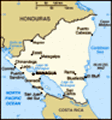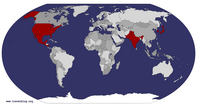Advertisement
"The best place in Nicaragua is Potosi!" my Austrian friend enthusiastically exclaimed without hesitation. As I learned more about this small fishing town on Nicaragua's northwest peninsula- I knew it was a place I had to visit- and it lived up to all the hype. I felt drawn to this pueblo after hearing about the amazing views of El Salvador, Honduras and the Nicaraguan peninsula from atop Volcan Cosiguina (the dead volcano looming in the town's background) and its setting right on the Pacific Ocean. Veronica, Achim and I decided to part ways for now as they were on the last leg of a nine month around the world trip that took them to five continents and in need of rest while I was ready to continue exploring Nicaragua.
I first had to travel to Chinendega and find the bus to Potosi- which took me over an hour walking around in the Nicaraguan heat during the hottest time of the day. I was drenched in sweat by the time I reached the bus and realized I had about 30 minutes before departure time. Meanwhile- the licuado (this is a shake made with fresh fruit, ice and milk) stands a few
blocks away were looking very appealing to me so I ordered my first sapote con leche. It was SO GOOD (sapote is a soft orange fruit only found in Nicaragua that kind of resembles a cantaloupe only tasting 10X better) that it would become my beverage of choice for the remainder of the trip whenever there was a licuado stand within my line of site!! I ended up boarding the bus right in time but by the time I arrived there was standing room only in the aisles- oh well another lesson learned- if you see a bus with empty seats on it be sure and board ASAP or else you will be standing for the whole ride.
The five hour ride up to Potosi was definitely another unforgettable adventure. About an hour after we left town we experienced some heavy torrential downpours due to hurricane Felix that was striking the Caribbean coast several hours east. The roads were so flooded with water that we had to slow down to about 5mph. The water was so high that it came up to the top of the second bus step (these are all old US buses so we are talking
probably about three feet deep)!! As we were slowly trucking along the water was so deep that the bus driver couldnt see the large rock that we ended up hitting. BOOM!! We stopped dead in our tracks for about 15 minutes as the bus driver and his helpers went to go fix the tire and somehow got us out much quicker than I expected. One of the things I absolutely love about Latin American travel is all the unpredictability that you constantly face- which I was certainly getting plenty of.
Finally I arrived at Potosi and the lady I was supposed to stay with was not home. This ended up being a blessing in disguise as I learned she charges foreigners $20 per night to stay at her place. Instead, I ended up sleeping on a hammock with a family for 15 cordobas per night- or less than $1 USD- how lucky I was to stay there!! This ended up being quite an experience as I slept next to Tomas and his family as we all slept on hammocks hanging in the same room. Tomas was considered one of the wealthier members in the community as he had 10
cows, 5 pigs and several roosters and chicken. The family also had a beautiful red and blue parrot that Tomas stumbled upon while walking around one day in his pueblo's surrounding forests. Tomas decided to take the bird home with him as it is endangered and said it often yells at his cows in spanish when they come too close.
My plan the first morning was to climb Volcan Cosiguina starting at 5:30 AM in order to avoid the intense Nicaraguan heat. However, I ended up waking up to the sounds of Tomas' roosters going crazy starting at 4:00 AM and every 15 minutes thereafter. I must have fallen back asleep at some point because I remember having my eyes closed and hearing "oink, oink, oink" and wondering what the heck was going on until I saw one of Tomas' pigs pacing back and forth underneath my hammock! I finally woke up for good at 5:00A or so and Tomas' son Pablo was ready to take me up to the volcano.
Pablo and I went into the forests as he chopped away a path for us with his machete while we snacked on berries hanging from the trees. I was amazed at the Nica heat- it was 7-8AM at this point and we were both dripping with sweat!! As we made our way up to the crater, Pablo was telling me how he loves reggaeton music and used to sell pirated CDs on the streets of El Salvador and Costa Rica- both economies are much better than in Nicaragua (Nicaragua is the second poorest country in the western hemisphere behind Haiti). His job in the CD sales industry would provide about $200 dollars per month and he seemed really excited about this as $200 is an extremely high salary in Nicaragua. Pablo now has his own farm in Potosi, owns several animals and chops away at the land with his machete every day from dawn until dusk. He had several kids with different women in El Salvador, Nicaragua and Costa Rica and was very surprised to hear that I have yet to spawn any offspring. In Central America I found it very common for men to have fathered 10 or more children with many different women- and it seems as though men are very proud of this as it serves as a way to prove their masculine nature.
We finally arrived to the volcano summit and could now see the crater and massive lake inside, which was a 250m drop from where we were standing. From the lake, Pablo was saying that many people scale the walls to arrive where we were standing one week later. From the peak of the volcano, we could see beautiful views of the Pacific Ocean, islands in El Salvador, volcanoes in Honduras and the vast Nicaraguan terrain- pure beauty (these pics do no justice to the scene)!!!
As we walked back down to his pueblo, we could smell the fresh coffee crops all around us- increible!! When we arrived back into town- I went over to the local comedor and placed my order for a pescadito (fish) dinner. This was a family owned place where the mother and daughter cooked, the son went fishing in the sea and the father went to Chinendega (the closest city with a large market- a 5 hour bus ride away) frequently to buy fruit and other food for the comedor. Tonight Wilbur, the son, was going to catch something good for me in the ocean to eat- and he did not disappoint. I returned three hours later and I had two big fish, a portion of gallo pinto, some lettuce and a cup of Nicaraguan coffee for just 25 cordoba (a little bit more than $1 USD)!! Sabroso!!
I enjoyed the beach in this town as well- as this was the only beach I've ever seen with cows, pigs and chicken roaming freely a few feet away from the water while their owners fished all day in the ocean. While at the beach one day, I came across some kids digging away at this shipwreck from 8 years prior. As they dug away at the rusted steel frame buried deep into the ground, I offered them my advice and helped them a bit with their work. They were using these little mallets that seemed to be giving them very little progress. After awhile of working away at the shipwreck, one of the kids led me to the the pueblo's pool that a peace corps volunteer constructed several years earlier. We began to chat and I told them about Michigan's snowy weather and how everything was white and cold in the winter- something they have never experienced before. While we were talking I mentioned to Carlos, a sixteen year old kid who was working hard at the shipwreck, that I really liked his necklace. Then without hesitation he took it off and handed it to me and said it was my "regalito" or gift. As much as I did not want to accept his gift seeing as the people in town were all very, very poor- he absolutely insisted that I keep it. I found this to be a very touching gesture of kindness on Carlos' part and found his generostiy to be very inspiring.
That night we experienced more torrential downpours as Tomas showed me how to collect rainwater (there was no running water in town) that I could take with me on my journey to Managua the next morning. The following morning I left at about 5AM to catch to bus to the capital city and thanked Tomas and his family for all of their hospitality. What another great eye opening experience, this time in Potosi!!
Advertisement
Tot: 0.067s; Tpl: 0.012s; cc: 10; qc: 27; dbt: 0.0445s; 1; m:domysql w:travelblog (10.17.0.13); sld: 1;
; mem: 1.1mb









